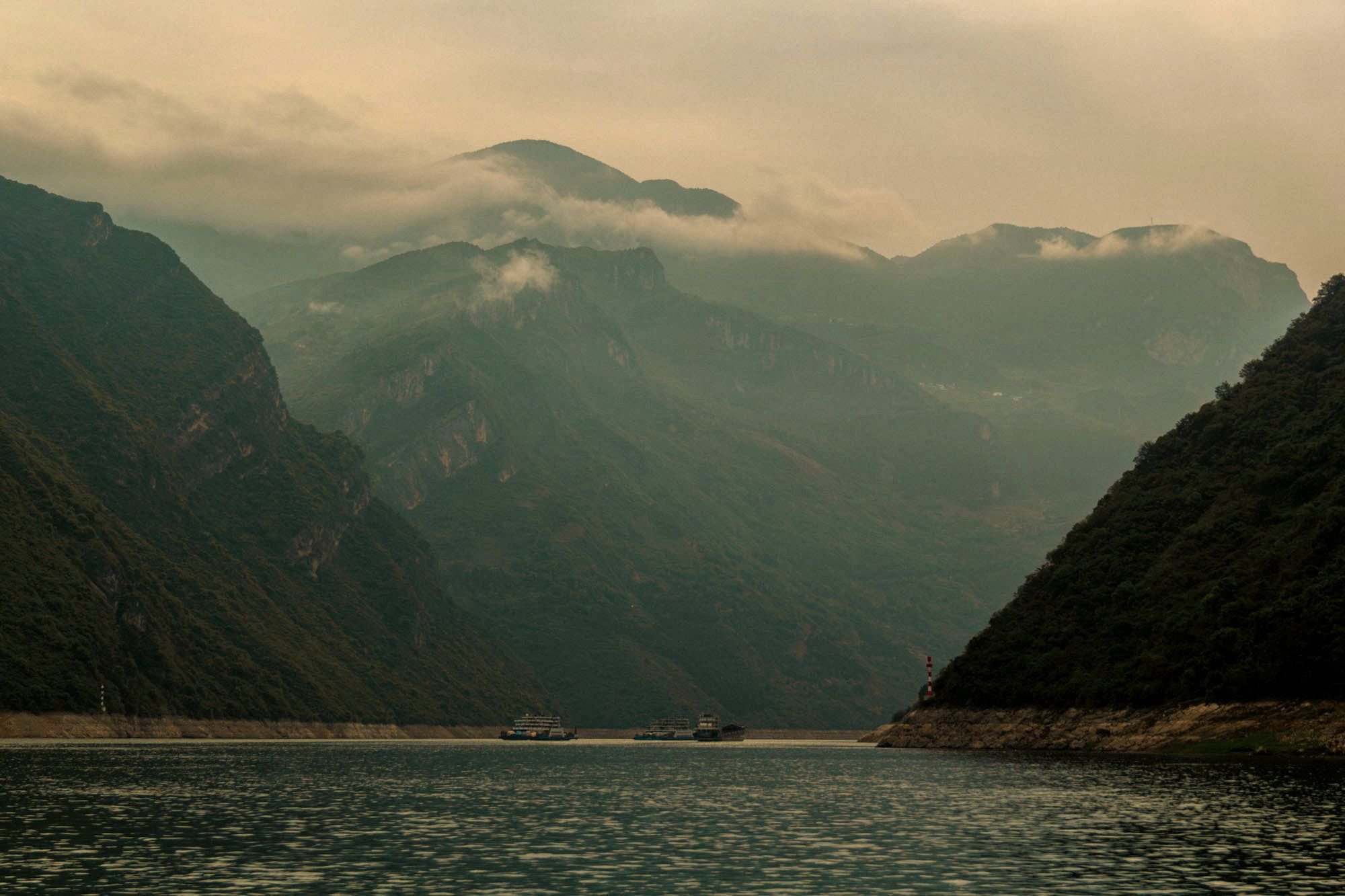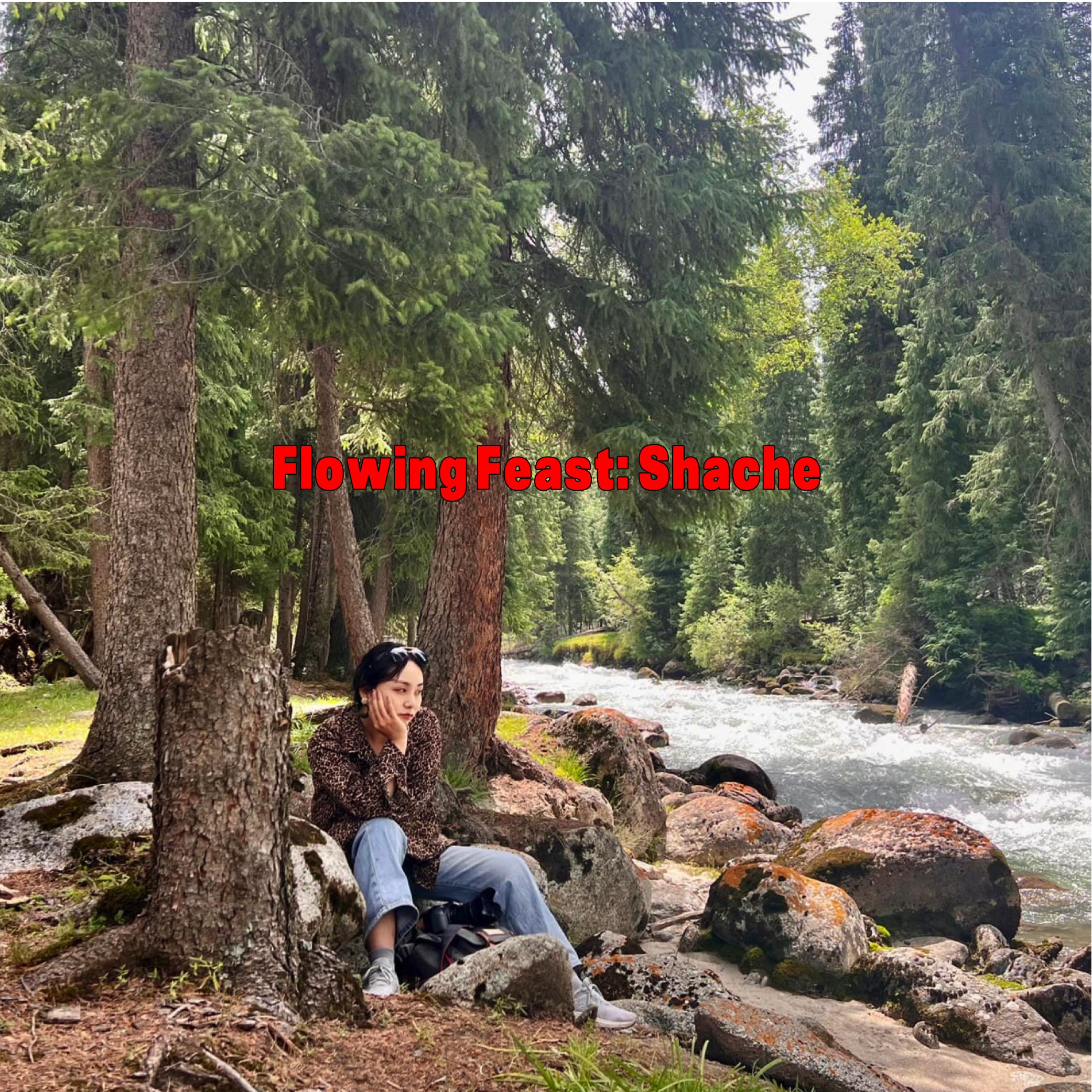My City: A Chongqing Story
A Red Boat
At the top of the Three Gorges in Fengjie County, the sun was obscured by heavy clouds, with intermittent rays of light streaming over the Yangtze River, resembling divine guidance. A small, unassuming red boat slowed its pace as it leisurely navigated through the Qutang Gorge. The five-star red flag, China’s national emblem, soared proudly on the mast, billowing in the wind as a symbolic guardian of this land.
With over half a century of experience navigating the Yangtze, the seasoned captain of the red boat slid open a window. His eyes ablaze with passion, he enthusiastically pointed out, "Just ahead lies Kuimen, immortalized on the ten-yuan renminbi note. And next to it stands White King's town." The wind whistled past the cosy wheelhouse, echoing like the trumpets of ancient battlefields. Meanwhile, the river surged forward, exuding a sense of formidable power akin to an unstoppable army.
Kuimen towered over the river, flanked by towering cliffs on either side, appearing in the distance like a colossal gateway spanning the river. Upon closer inspection, Kuimen resembled a mighty ancient general gripping a massive axe, resolutely stationed to guard the eastern passage into the stronghold of the Shu Road pass. The rugged textures etched on the rock face, weathered by the sands of time, echoed tales of epic proportions and the ever-changing tides of history. Within the winding expanse of the eight-kilometre-long Qutang Gorge, Kuimen stood as the western sentinel, beckoning ships and travellers to experience its magnificent natural beauty.
Excited tourists were clamouring onto the deck, clutching their 10 yuan bills, eager to capture snapshots with Kuimen, cherishing the indelible memories forged at that moment. One tourist, moved by the sight, recited a verse: "Leaving at dawn the White King crowned with rainbow cloud, I have sailed a thousand miles through Three Georges in a day. With monkeys' sad adieus the riverbanks are loud; My boat has left ten thousand mountains far away."
This ancient poem seemed to reverberate gently through the annals of history, transporting individuals back to the ancient Yangtze River of 1265 years ago. At that time, the renowned poet Li Bai (701-762), aged fifty-eight, was unexpectedly pardoned during his exile to Yelang. His heart brimmed with joy as boundless as the coursing waters of the river. At daybreak, Li Bai embarked on a ship from White King's Town, traversed the perilous Qutang Gorge, journeying eastward with unwavering resolve, envisaging his swift arrival in Jinling (modern-day Nanjing, Jiangsu Province) to reunite with his long-awaited kinfolk.
As the cruise ship glided past the red boat, it resembling a colossal river beast, exhaling silver-white steam into the air. In contrast to the red boat, the cruise ship exuded a more grandiose and opulent aura. Some tourists on the cruise ship stood on the expansive deck, while others lounged by the room railings, capturing the panoramic view with their cell phones.
A simple villager sat on the deck of the red boat, leaned against the iron gate while cradling a lively little girl in her arms. She sighed, "The Three Gorges used to be even more breathtaking than it is now." She fondly recalled the towering cliffs that once flanked the river, the crystal-clear shallow waters glistening with a transparent green hue, and the churning depths displaying a deep blue-green color. She remembered how, whenever they encountered shallows, the boatmen would disembark to guide the boat through, bumping over small rocks and leaving a lasting impression of turbulence. However, following the completion of the Three Gorges Dam, the water levels rose substantially, submerging ancient counties like Fengjie and Wushan, leading to the relocation of millions of residents to new areas, with some even moving to distant provinces. Pointing into the distance, she remarked, "Look, there's a hanging coffin there!"
I scanned the area with wide eyes but failed to spot it. Two villagers came forward to indicate the direction, while the captain leaned out and guided the boat towards the cliff on the left. As we neared the rocks, I finally caught sight of the hanging coffin. Two thousand years ago, villagers laid their departed relatives to rest in elevated locations, viewing it as the ultimate act of filial piety believed to bring good fortune. "How did they manage to hoist the heavy coffins up the cliff and position them so precisely?" pondering a middle-aged man. This ancient enigma, shrouded in untold tales, lies concealed within the currents of the Yangtze River, awaiting a courageous soul to unravel its secrets.
At that moment, a young and stylish man accompanied the middle-aged man as they made their way up to the second-floor wheelhouse together. Inside the wheelhouse, the intercom was broadcasting information about the water levels, river traffic congestion, and the locations of various cargoes. The middle-aged man engaged the captain in a friendly conversation. The captain, with a ready smile, graciously vacated his seat at the helm, handing over control of the steering to the young man. Meanwhile, the captain stood firm, peering through binoculars at the distant scenery ahead. Upon spotting people waving, he promptly instructed the young man to sound the boat’s whistle as a welcoming gesture. The red boat glided slowly towards each gentle slope in succession.
Rolling hills extended toward the sky on both sides of the Yangtze River, creating a picturesque backdrop. Scattered villages dotted the riverbanks, with numerous boats moored along the shores. A diesel speedboat loaded with fresh produce and daily essentials swiftly passed. A fisherman, his bucket full of fish, joyfully leaped ashore and headed home quickly. Villagers relaxed on the verdant grass, perched on rugged rocks, and peacefully sat on the newly rebuilt stone steps, cradling their children, playing with their puppies, and soaking in the warm spring sunlight. As the red boat approached, they lifted their loads onto their backs, gathered their belongings, embraced their children, petted their animals, and prepared themselves methodically to board the boat. The captain's son and a young man in a life jacket stood on the deck, first assisting with the cargo loading before gently helping the villagers board the boat.
The deck was adorned with arrays of freshly picked fruit: red cherries, golden loquats, sweet mandarins, and heavy navel oranges, all carefully placed in baskets woven from bamboo strips. The cherries and loquats were covered with bright green leaves, while the baskets of navel oranges were tightly wrapped in nylon woven bags.
One villager waved his hand anxiously, saying, "I can't sell my loquats; I have to save them for my daughter. "
The captain's son moved the electronic scale from the kiosk, placing it on the deck to begin weighing the cherries for tourists at 20 yuan per kilogram. The tourists then walked to the galley with bags of cherries. In the galley, a quaint square table was set up, with various condiments such as soy sauce, oyster sauce, canola oil, and salt placed by the sink. Soon, the sweet and sour fruity scent danced and lingered in the air. Beside me, I could hear the sounds of the engine and the Yangtze River water lapping against the hull of the boat.
Inside the cabin, passengers were engaged in different activities: some quietly gazed out of the windows, lost in thought; others snuggled against the backrests, enjoying moments of peaceful rest. A few were curled up on benches, hands shielding their eyes, lost in dreams. Occasionally, someone would lean out of a window, feeling the river breeze brush against their face. In a cardboard box, a puppy cautiously peeked out, comforted by its owner. This young dog, less than a year old, was experiencing its first ride on the red boat, initially frightened on deck and shivering from the cold.
The young man piloted the red boat into a tranquil harbor, where sunlight gently filtered through wispy clouds, casting a serene glow upon the ships' hulls. "We've arrived! Quite a departure from navigating a cargo ship," he exclaimed with excitement, relishing the experience of maneuvering a red boat. With a joyful smile, he returned the helm to the captain.
The middle-aged man and the young man descended to the cargo area on the first floor. Boxes filled with instant noodles, beverages, vegetables, fruits, and other daily necessities were neatly stacked around them. Together, they efficiently moved these items to the deck. Afterwards, they carefully ascended the ladder of the cargo ship. On deck, the crew had already prepared ropes, deftly lowering them to facilitate the goods' ascent. Meanwhile, the young man stood vigilantly, his gaze fixed on the cargo below, skillfully catching lightweight items with precise movements. Once all goods were aboard the cargo ship, the captain navigated the red boat out of the harbor and set course for Wushan County. As the middle-aged and young men waved goodbye, their cargo ship, stocked with kerosene, sailed from Nanjing, Jiangsu Province, to Fengjie County, Chongqing Municipality, after restocking supplies before continuing upstream to Chongqing Jiangbei Airport.
"In addition to the out-of-town crews, we'll be picking up villagers who work on the cargo ship," the captain remarked, his voice tinged with nostalgia. "Many of us have spent our lives along the Yangtze, our careers intertwined with shipping. There used to be many more." He sighed, contemplating the changes along the river. "Nowadays, many have chosen to leave."
The elderly woman made her way into the wheelhouse to inform captain of the passengers' disembarkation point. In a frail voice, she explained that the rising oil prices had pushed the fare from Fengjie County to Wushan County to 30 yuan per person for a one-way trip, now more expensive than before. The captain gestured for his son to take the helm, and as he stood on deck, hands clasped behind his back, he gazed into the distance, perhaps reminiscing about the bustling pier and the days when crowds were commonplace.
Wearing straw hats, villagers carried empty baskets and plastic boxes onto the deck. One villager removed 20 yuan from a white plastic bag, ready to pay the boat fare. Another villager, with dirt under his fingernails, rested a pair of hands on a satchel, guarding the money earned from selling vegetables and fruits in the county town that morning. Yet another villager leaned on thin crutches, happily carrying a carton of cigarettes separately. The words exchanged among them were like the wind in the fields, carrying the simplicity of life and laughter.
"All that way just to buy a carton of cigarettes?"
"You made a lot of money today! Why did you only buy yourself a small amount of biscuits? Get yourself some better food."
"You went to the city to get a machine. What are you going to do with it?"
"How much did you sell the mandarin oranges for today?"
"How much pocket money does your wife give you?"
"I don't need your help! I can walk by myself!"
In the crowd, a villager in a flowery dress stood out. She had skillfully sewn her family's fabric scraps into her baskets as lining, creating a unique beauty that drew people's attention. I couldn't help but exclaim, "It's so beautiful! " She shyly told me that her family made many things out of fabric scraps. Watching her easily pick up the baskets with her shoulder pole and lightly jump onto the bank, I felt as if I had seen a flower swaying in the breeze, vivid and alive. She suddenly turned her head with a bright smile and waved goodbye to me.
This scene brought back memories of my first ride on the red boat last fall. A grandmother in a flowery cotton jacket, her face weathered, waved goodbye to the children. Her eyes followed the faraway the red boat, and she gently rested her right hand on the root of a huge dead tree. At that moment, time seemed to freeze, and the air was filled with silent sadness.
More than a thousand years ago, Du Fu (712-770), a Tang Dynasty poet, wrote about the plight of women in Fengjie in his poem. He observed local women working hard to make ends meet by cutting firewood, selling it in the market, and even risking their lives to carry salt for a meager income to support their families, while the men sat idly at home. These women toiled tirelessly throughout the year with tear-stained faces, thin clothes, and wild flowers on their heads, living in the remote foothills of the mountains. Despite their youth, they were so emaciated from overwork that they couldn't even marry.
The red boat had been sailing for four hours when the river wind gradually intensified, behaving like a wild-tempered beast pushing the boat into an ominous darkness. The once-clear sky now loomed with dark clouds, threatening to engulf everything, as if a colossal black hole were descending upon us. The weather around Wushan was indeed capricious, with winds and clouds shifting unpredictably.
"How did you handle the helm?" the captain demanded, his expression grave as he looked up at his son. The son bowed his head, lips pursed, offering no reply. As the boat slowly approached the broad dock of the Daning River in Wushan County, the captain returned to the wheelhouse. With practiced skill, he maneuvered the boat, deftly guiding it into a narrow berth without a single bump, positioning it snugly between the red boats.
The ropes were rough and wrapped around the iron piles, and the pier was instantly swarming with people, like a swarm of noisy bees. Bangbangs (Chongqing porters) hurriedly boarded the deck, carrying heavy burdens to the wholesale fruit market, priced at only 10 yuan for once. In the chaos of the crowd, a young mother holds her child in her arms and watches silently at the edge of the crowd, looking forward to the moment of family reunion. A villager and his daughter shared a motorcycle ride to their home in the county, the daughter's arms filled with loquats that her father had carefully selected. Several villagers tried to fit the closet door into the tricycle. At the moment when night was about to fall, the roar of motorcycle and tricycle engines echoed from the pier as the rain poured down.
The Three Gorges of the Yangtze River—Qutang Gorge, Wu Gorge, and Xiling Gorge—extend from west to east. To explore Wu Gorge, I boarded a red boat at 8:00 a.m. the next morning from the Daning River dock in Wushan County. In the past, these boats navigated the 46-kilometer-long Wu Gorge to Badong County in Hubei Province, but now they only reach Peishi Township in Wushan County, Chongqing Municipality. The captain's wife tended to the passengers while their granddaughter sat quietly among the cargo. The misty landscape visible through the boat's windows resembled a beautiful ink painting.
I disembarked at the Qingshi Village pier. Before the Three Gorges Dam impoundment, the village was home to 244 families, out of which 32 opted to rebuild in Diecui Peak. Today, only a dozen families remain. In front of abandoned houses, tattered fishing nets hang from lush trees, gently swaying in the breeze. Villagers who desire fish now fish at the Goddess River. On the way to Diecui Peak, the path was scattered with rocky debris and occasional wild loquat trees clinging to cliffs. As I carefully ascended, following the ancient Ba Yan Road, I stumbled and briefly sat on a nearby rock, nursing a sore foot. For millennia, villagers endured perilous mountain trails, hauling heavy salt loads to sustain their livelihoods—a grueling task, especially for the frail-bodied girls who carried such burdens unimaginably.
In the distance, I couldn't discern how soon I would reach the summit, and occasionally, the sounds of unfamiliar creatures emanated from the dense forest. I selected a spacious spot and gazed at Goddess Peak from afar. Previously, I had stood atop the opposite mountain range, observing Wu Gorge from a distance where rolling hills intertwine with green and red leaves, creating a vibrant picture. The evening sunlight tinted Wu Gorge like a delicate veil softly draped, exuding a gentle and graceful allure that captivated hearts. Legend has it that Yao Ji, the goddess of Wushan, once resided here. Nowadays, Goddess Peak adorns gorgeous green robes, while the river winds like a jade belt, presenting a captivating stance and revealing its slender profile in the sunlight.
"This place boasts magnificent mountains and beautiful scenery, but the customs and living environment leave much to be desired," sighed Du Fu helplessly. Chongqing’s mountainous terrain was unsuitable for farming, leading to salt peddling and water transportation becoming the primary means of livelihood in ancient times. The inhabitants were generally uneducated, favoring gambling and risk-taking. Du Fu was perplexed by the apparent lack of cultivated talent in this place, despite the presence of great poets such as Qu Yuan (circa 340-278 BC). He detested the pervasive smell of fish and the daily fare of bitter, fishy yellow seabream. After receiving a letter from his younger brother, Du Fu, who had been wandering for half his life, resolutely gave up his stable life and handed over 40 mu of orchard to a friend. Packing his clothes and books, he bid farewell to Fengjie and sailed downstream through Qutang Gorge and Wu Gorge, aspiring to return to Chang'an. However, fate had other plans, and on a small boat on the Yangtze River, he bid farewell to this world forever.
Under the blazing sun, cruise ships and freighters slowly sailed downstream on the Yangtze River, about to pass through Chongqing and enter Hubei Province. The Yangtze River meanders over 6,300 kilometers through Qinghai, Sichuan, Tibet, Yunnan, Chongqing, Hubei, Hunan, Jiangxi, Anhui, Jiangsu, and Shanghai before finally reaching the East China Sea and flowing towards the vast Pacific Ocean. In order to catch the red boat returning to Wushan County at 2:00 p.m., I began my descent when I was still one-third of the way from the mountain top. On the hillside near Qingshi Village, onions, lettuce, potatoes, and other vegetables were planted. A villager with a straw hat, bent at nearly ninety degrees, diligently plowed the land; nearby, a family solemnly worshipped their deceased relatives at the cemetery.
On the approach to the village, a villager sat beneath a towering old tree, guarding a row of beehives buzzing along the cliff face. With his guidance, I reached the yard of another villager's house, awaiting the return of the red boat to Wushan County from Peishi Country. The yard was tidy, with freshly picked vegetables basking in the sun and two small dogs playing in the shade. The dark blue kitchen overlooked the turquoise Yangtze River and Wu Gorge, while outside the window, an oleander spread towards the river, adorned with bright red blooms. After purchasing a bottle of mineral water from the villager's house, she informed me that Qingshi Village lacked direct highway access. Occasionally, villagers would ask the red boat's captain to bring rice, noodles, oil, and other daily essentials. Nowadays, the village is predominantly inhabited by elderly residents who oversee homes submerged by the Yangtze River. Meanwhile, their children pursue education, work, and city life, returning to the village during festivals to visit elders and honor ancestors.
At 8:00 a.m. on the third day, I switched to another red boat and continued my journey upstream to Fengjie County. The red boat operates only one round-trip per day from Wushan County's Daning River dock to Fengjie County's Red Boat dock, departing at 8:00 a.m. (adjusted to 7:30 a.m. in the summer), and returning to Wushan County at 1:30 p.m. from Fengjie County.
A girl working on a Royal Caribbean cruise ship chatted animatedly with the captain of the red boat, discussing sea views, the ship's layout, diverse staff work styles, and passenger stories. When she mentioned the cruise's wheelhouse, the captain's eyes lit up. As the red boat approached Qutang Gorge, he stood from his seat, gazing into the distance. Meanwhile, tourists left the wheelhouse to gather on the second-floor deck and enjoy the breathtaking scenery. In the lower deck cabins, villagers took the opportunity to rest. Before dawn, they woke up to pick fruits from trees and vegetables from the ground. Upon docking, they would head to the county to sell their produce.
"The villagers along the Yangtze River depend on the red boat," the captain said. His tall figure was mirrored against the mountain outside the window, resembling two guardians, bearing endless missions and emotions. It dawned on me that within this brief journey, life unfolds as ceaselessly as the Yangtze River, and we are merely fleeting moments within it, simultaneously insignificant yet profound.
Red Boat Dock-Fengjie County
Qutang Gorge-Fengjie County




Daning River Dock-Wushan County
Wu Gorge-Wushan County



























































































